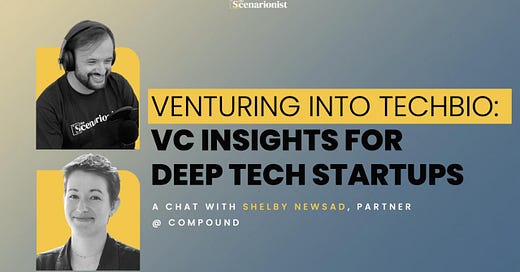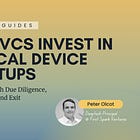Welcome to the 70th edition of Deep Tech Catalyst, the channel by The Scenarionist, where science meets venture!
✨ For more, see Membership | Deep Tech Briefing | Venture Guides
In this episode of Deep Tech Catalyst, we dive into the evolving landscape of TechBio—a space where biology meets artificial intelligence and startups are reimagining how we discover and develop new therapies.
We’re thrilled to welcome Shelby Newsad, Partner at Compound and one of the sharpest minds operating at the intersection of AI and biology!
Together, we explore what defines a TechBio company, how technical and scientific talent converge in this new generation of startups, and what it takes to build an investable business in this space.
From data infrastructure to clinical timelines, and from team formation to exit strategy, this conversation breaks down the real-world dynamics of launching and scaling a TechBio venture.
Let’s dive in. 🎯
✨ Before Go Ahead:
Deep Tech Catalyst is just one part of The Scenarionist experience. To get the full experience, become a Premium Member!
The Scenarionist Premium is built to help you level up as a Deep Tech Founder, Investor, or Operator. As a Premium member, you’ll get exclusive access to weekly unique Insights, Analysis, and Venture Guides packed with the hard-earned lessons and experience of those who’ve successfully built and backed deeptech ventures.
Invest in yourself—upgrade today!
LESSONS LEARNED
From Vision to Venture: How TechBio Is Redefining Drug Discovery
TechBio is emerging as a powerful movement at the intersection of science, computation, and entrepreneurship. Unlike traditional biotech firms, TechBio startups are often led by scientists who want to shape their own destiny—not by selling to Big Pharma, but by building enduring, independent companies.
These companies span a wide range of areas—from therapeutics to lab automation to software—but share a few core attributes: they are founder-led, engineering-driven, and ambitious in vision. At the heart of TechBio is a belief in accelerating science through computation and in reimagining the pace and process of innovation in human health.
The Vision: From 10 Years to 5
Traditional drug discovery is a long and capital-intensive journey. From the initial identification of a molecule to achieving clinical success, the timeline typically spans around 10 years.
TechBio startups aim to cut that in half.
By leveraging machine learning, targeted indications, and faster clinical pathways, many TechBio companies are aiming to go from discovery to market in 5 to 7 years. This acceleration is not only about speed—it’s about creating a fundamentally new R&D model that combines the best of biology and computation.
Building the Right Team: Where Biology Meets Computation
One of the most persistent challenges in TechBio is assembling teams that combine world-class technical talent with deep domain expertise in biology and clinical development. These are fundamentally different skill sets—and often different cultures. Yet, their collaboration is essential.
Effective TechBio companies must unite machine learning experts who can build predictive models with scientists who understand how to move assets through clinical trials. This convergence is still rare, but increasingly necessary to create truly investable companies.
Unlocking Value Beyond the Lock-and-Key Model
While many TechBio platforms focus on optimizing drug-target binding—the classic lock-and-key paradigm—there are broader factors to consider.
How toxic is the compound?
What off-target effects might occur?
Are the right patient populations being selected in trial design?
Answering these questions early in the pipeline is critical. More companies are starting to address these challenges up front, which has the potential to increase efficiency, reduce downstream risk, and improve the odds of clinical success.
Data as a Key Differentiator
Human health data is becoming increasingly abundant, thanks in part to national-scale biobanks. Projects like the UK Biobank, the Finnish Biobank, and the U.S. “All of Us” initiative now contain millions of genomes linked to electronic health records (EHRs).
This combination enables powerful predictive modeling: identifying disease risk, forecasting drug response, and informing public health interventions.
For TechBio founders, these datasets represent a rich, underutilized resource.
The opportunity lies in mining them effectively, not just accessing the data, but turning it into actionable insights.
The Missing Layer
While human data is increasingly available, molecular data remains a bottleneck—particularly in drug discovery. Traditional assays often examine how a drug binds to one specific protein. But the body contains over 20,000 proteins, and off-target interactions can profoundly affect both efficacy and safety.
Understanding the proteomics layer—the full range of proteins in a cell and how they interact with a compound—could unlock new levels of precision. The holy grail would be a system that shows on- and off-target effects across the entire proteome in real time. That kind of visibility could transform early-stage drug development.
Market Research, Comparables, and Inflection Points
Before approaching investors, TechBio founders need to deeply understand the market landscape. This means identifying comparable companies, analyzing their paths, and understanding what has (and hasn’t) worked in the past. Knowing which milestones others achieved—and when—can help define a credible and compelling roadmap.
While early-stage venture data is often opaque, much can be learned by simply asking.
Conversations with co-investors, other founders, or industry experts can provide key insights into valuation benchmarks, deal structures, and commercial inflection points.
Where to Look for Comparables
Popular database tools are go-to sources for scouting comparable companies. They provide funding data, investor lists, and major news milestones. While they often require a subscription, even free or limited-access versions can offer valuable information.
Press releases are another underrated source. Announcements about fundraising rounds, partnerships, and regulatory progress can shed light on a company’s momentum and valuation trajectory.
For founders, gathering and analyzing this information demonstrates to investors not just scientific insight, but market fluency.
Defining Inflection Points
In venture terms, an inflection point is a moment when a company’s trajectory changes—usually for the better. It’s a milestone that de-risks the business and often unlocks a step up in valuation.
In therapeutics, common inflection points include successful animal studies, positive results from a Phase 1 trial, or hitting a key regulatory milestone.
Each of these signals progress, boosts investor confidence, and can significantly enhance a company’s fundraising potential.
For platform companies, proof of concept for the platform itself can be the key early inflection point. Founders who can articulate this clearly tend to stand out.
Roadmap & Exit Strategy
While TechBio companies still navigate the classic steps of drug development, there are emerging ways to move faster and more efficiently.
One such change is the FDA’s new platform technology designation, which allows companies to bypass repetitive preclinical steps when building multiple therapies on the same base platform.
This is a game-changer for capital efficiency—especially for companies with ambitions to launch not just a single therapy, but a full pipeline.
While M&A remains the dominant exit route in life sciences, a growing number of TechBio founders—and investors—are aiming higher. IPOs are seen not only as liquidity events, but as strategic moves for category-defining companies that can stand on their own.
In practice, the goal is optionality.
The strongest companies position themselves to be attractive acquisition targets and to pursue an IPO if market conditions and traction align.
TechBio Dynamics. Exploring what’s behind the hype
“The biggest innovations of the 21st century will be at the intersection of biology and technology” - Steve Jobs














